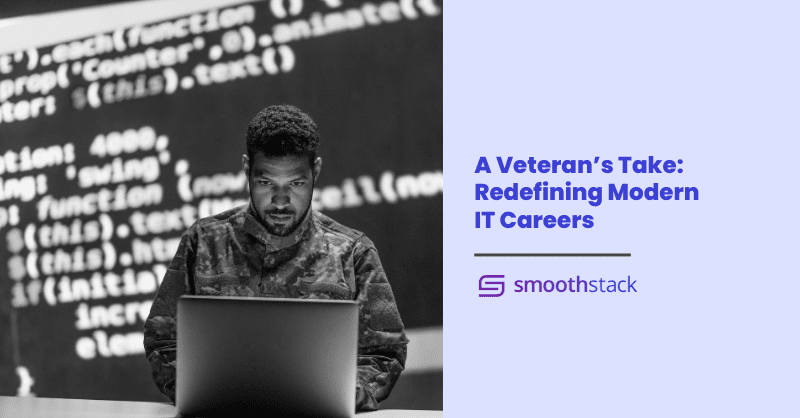A Veteran’s Take: Redefining Modern IT Careers

The crippling talent shortage. A severe supply and demand imbalance. The breakneck pace of innovation. The pressure to digitally transform. These aren’t just the challenges keeping CIOs up at night – they are the driving forces behind the redefinition of the modern IT employee.
In large part because of these trends, many of today’s IT employees are taking the career path less traveled. Some are being poached from other industries and reskilled, a strategy that many state governments are adopting to find tech talent. Many are going through accelerated training programs vs. earning four-year degrees. Others are having to reinvent themselves to keep up with market needs.
An IT career path gaining popularity is one that goes through the military. That was the case for our guest speaker last month, Nate Vanderheyden, the Executive Director of U.S. Banks Cyber and Information Security at Morgan Stanley.
During our time together, Nate shared the non-traditional route to his own tech career. Not unlike others who aren’t quite sure which career path to choose, Nate decided to enlist in the military. He left for boot camp just two weeks after his high school graduation.
It was there that he discovered his passion for cybersecurity, entering a six-month program that landed him a role as an intelligence analyst before serving as Technical Director for the U.S. Marine Corps Forces Cyberspace Command.
When deciding on his next move, Nate prioritized an ability to make an impact as a career goal. His experience with Morgan Stanley has been a fulfilling one, praising its corporate culture and the opportunity to help protect the company’s systems against cyber crime.
Not only does Nate have insight into hiring tech talent today, he also has a unique perspective on what it takes to be successful in the industry. In our conversation with him, we discussed some best practices when it comes to hiring non-traditional IT talent – and navigating that hiring process as a job seeker.
For businesses: Identifying high-potential cyber security talent
We’ve previously written about the non-technical markers of high-potential IT talent, and how these soft skills lend themselves to tech work. Nate goes a bit deeper to speak directly to what traits are inherent in a good cyber analyst.
Lifelong learner. The world of cyber crime is always changing, as threat actors aim to stay several steps ahead of cybersecurity professionals. A good cyber analyst recognizes the need to be adaptive and flexible, and that requires them to stay informed of the latest trends and tactics in the industry.
High degree of humility. Nate shared that the ability to embrace vulnerability is a strength, not a weakness, in the cybersecurity space. There are many unknowns when it comes to cyber crime, and it’s impossible to have all the answers immediately. A good cyber analyst recognizes that.
Detail oriented. There’s a high degree of sophistication when it comes to cyber threats today. Cyber analysts who are detail oriented are more likely to pick up on inconsistencies and less obvious details that can lead to important discoveries and breakthroughs.
Nate also shared the one trait that separates early-career cyber analysts from experienced professionals – the ability to see the big picture. Those who can see the forest for the trees, so to speak, can tap into other functional programs, better enable analytics teams with better data, and measure protections of the business against goals and objectives.
For candidates: Building a modern IT career
Many companies and top IT staffing firms have filters in place to weed out under-qualified talent before a person ever sees their resume. For job seekers who lack certain degrees, certifications, or experience, this is a devastating roadblock. What can job seekers do to stand out?
Apply in person. In-person events like career fairs allow job seekers to speak directly with recruiters and IT hiring managers. Instead of leaving their resume to chance, in-person opportunities allow job seekers to make a case for themselves – and a good impression.
Network. Never underestimate the power of relationships. Nate recommends that job seekers cultivate relationships with those who work at their dream employers to hopefully create internal advocates for their employment.
Stay current. Cyber security professionals must be immersed in the industry in order to keep up with threat actors and cyber criminals. Nate recommends attending conferences, joining online communities like r/netsec, and using generative AI like Chat GPT to flatten the learning curve when it comes to security topics. He also recommends The Cybersecurity Canon for a curated catalog of resources.
Nate also had advice for other veterans looking to jumpstart their civilian careers after service. He advises transitioning veterans to use their GI Bill to connect with organizations that can help with employment. Once in a new role, he advocates for joining a veterans group to connect with like-minded colleagues with a shared language based on common experiences.
He cautions against feeling extra pressure or questioning belonging, and shares that veterans should know their worth, focus on learning the corporate vernacular, and put their best foot forward.
Many thanks to Nate for taking the time to share his story as well as his thoughts on both building IT careers and hiring non-traditional candidates in today’s market.
Let’s Build Your Team
Connect with the Smoothstack team to learn how to close your digital skills gap with a custom-trained team.